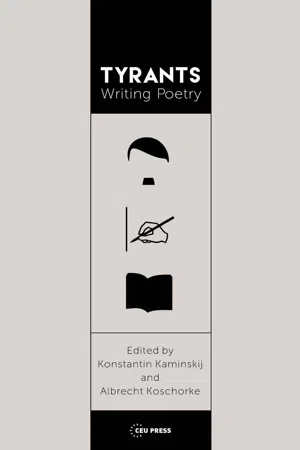
Tyrants Writing Poetry
- 294 pages
- English
- PDF
- Available on iOS & Android
About this book
Why do tyrants - of all people - often have poetic aspirations? Where do terror and prose meet? This book contains nine case studies that compare the cultural history of totalitarian regimes. The essays focus not on the arts, literature or architecture but on the phenomenon that many of history's great despots considered themselves talented writers. By studying the artistic ambitions of Nero, Mussolini, Stalin, Hitler, Mao Zedong, Kim Il-sung, Gaddafi, Saddam Hussein, Saparmurat Niyazov and Radovan Karadzic, the authors explore the complicated relationship between poetry and political violence, and provide a fascinating look at the aesthetic dimensions of total power. The essays make an important contribution to a number of fields: the study of totalitarian regimes, cultural studies, and biographies of 20th century leaders. They underscore the frequent correlation between tyrannical governance and an excessive passion for language, and demonstrate that the combination of artistic and political charisma is often effective in the quest for absolute power.
Tools to learn more effectively

Saving Books

Keyword Search

Annotating Text

Listen to it instead
Information
Table of contents
- Cover
- Title page
- Copyright page
- Table of Contents
- Introduction ALBRECHT KOSCHORKE AND KONSTANTIN KAMINSKIJ
- The Tyrant with His Back to the Wall: Nero’s Artistic Self-Expansion (ULRICH GOTTER)
- Benito Mussolini: “Babeuf ” (1902)
- Poetry and Tyranny: The Case of Benito Mussolini (RICHARD JAMES BOON BOSWORTH)
- Joseph Stalin: “Over This Land” (1895)
- Stalin’s Writing: From the Romantic Poetry of the Futuret o the Socialist Realist Prose of the Past (EVGENY DOBRENKO)
- Adolf Hitler: Excerpt from Mein Kampf (1924)
- Ideology in Execution: On Hitler’s Mein Kampf (ALBRECHT KOSCHORKE)
- Kim Il-sung: “Poem Dedicated to Comrade Kim Jong-il on His 50th Birthday” (1992)
- Dead Father’s Living Body: Kim Il-sung’s Seed Theory and North Korean Arts (SUK-YOUNG KIM)
- Mao Zedong: “Snow” (1936)
- Mao Zedong’s Poetry: Form as Statement (KARL-HEINZ POHL)
- Muammar al-Gaddafi: Excerpt from “Escape to Hell” (1993)
- A Poor Despot Descends to Hell: On the Writing and Thinking Styles of Muammar al-Gaddafi (HEINER LOHMANN)
- Saddam Hussein: “Unbind It” (2007)
- The Principle of Single-Handed Tyranny: On Saddam Hussein’s Literary Works (BURKHARD MÜLLER)
- Saparmyrat Niyazov: “You Are Turkmen” (2001)
- Saparmyrat Niyazov’s Ruhnama: The Invention of Turkmenistan (RICCARDO NICOLOSI)
- Radovan Karadžić: “Sarajevo” (1971)
- “Nothing Is Forbidden in My Faith”: The Metamorphoses of Radovan Karadžić (SLAVOJ ŽIŽEK)
- List of Contributors
- Back cover
Frequently asked questions
- Essential is ideal for learners and professionals who enjoy exploring a wide range of subjects. Access the Essential Library with 800,000+ trusted titles and best-sellers across business, personal growth, and the humanities. Includes unlimited reading time and Standard Read Aloud voice.
- Complete: Perfect for advanced learners and researchers needing full, unrestricted access. Unlock 1.4M+ books across hundreds of subjects, including academic and specialized titles. The Complete Plan also includes advanced features like Premium Read Aloud and Research Assistant.
Please note we cannot support devices running on iOS 13 and Android 7 or earlier. Learn more about using the app